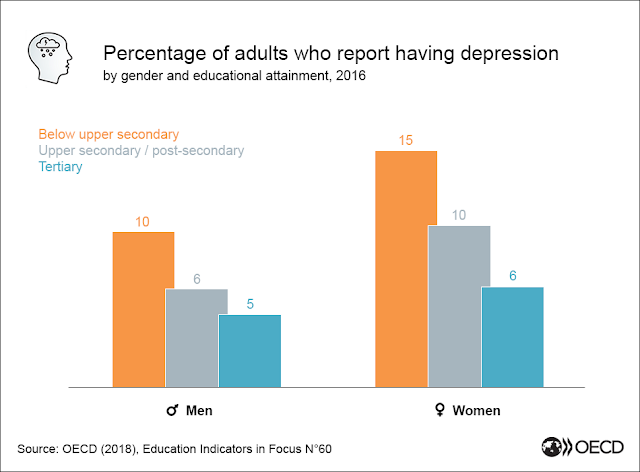By Simon Normandeau
Statistician, Directorate for Education and Skills
The World Health Organization estimates that depression affects over 300 million people worldwide, making it the leading cause of disability. Suffering from depression can make it extremely difficult for an individual to function properly at school and at work; not only does this have an impact on the lives of those affected and their surroundings, but it also has wider economic consequences for societies at large, mainly due to high medical costs and employee productivity loss. In fact, recent studies have found that the total annual costs related to depression exceed EUR 90 billion in Europe, making it one of the most costly mental disorders.
These numbers are calling for action. But can education systems do anything about it? The answer is not so clear cut, but there may be evidence to show that education has at least some part to play in combating depression. The latest Education Indicators in Focus sheds some light on the relationship between education and depression, demonstrating that adults with low educational attainment are often those who report the highest level of depression. However, it is also true that depression among students may in itself be a cause for lower educational attainment, making it impossible to say for sure whether better education results in a lower likelihood of depression.
Even so, this ambiguity should not discourage us: education systems can still play a role in tackling depression and should strive to keep people in education at least until they complete upper secondary education. This means giving appropriate support to low-performing students and ensuring a climate of well-being in the classroom, thus creating an atmosphere that promotes positive attitudes towards mental health and provides all students with the best possible chance to succeed.
Even among similarly-educated adults, the likelihood to report depression varies greatly across countries, and can reflect cultural attitudes towards, and awareness of, mental health issues. The share of low-educated adults who say they suffered from depression is particularly high among low-educated adults in Iceland (above 20%), while it is generally low across different education levels in Italy. The results for Iceland are in line with an OECD report that showed that the country is the largest consumer of antidepressants per capita. The low rates in Italy, on the other hand, might be related to cultural taboos around depression: a recent study found that three quarters of Italians believe that people suffering from depression should avoid talking about their problems.
The differences are not just between countries: gender also plays a significant role in the likelihood to report depression. The chart above shows that, on average, women report higher levels of depression than men, but the likelihood to report depression decreases more steeply as women acquire further qualifications. This decreasing gender gap may be explained by the varying job prospects across different levels of educational attainment: being employed tends to be associated with a lower prevalence of depression, and the gender gap in employment rates also generally decreases as educational attainment increases.
Having a mental illness can also hinder the chances of finding a job; but at the same time, mentally ill people who find employment often show improvement in their condition through a greater sense of worth in the society and through enhanced self-esteem. It is therefore important that education systems ensure a smooth school-to-work transition, especially for those who perform poorly at school as they are likely to suffer from cumulative disadvantages. Students should enter the labour market equipped with the skills to properly flourish and break the vicious cycle that can lead to or sustain depression.
Although awareness of depression goes all the way back to the ancient Greeks and Romans, the illness is still stigmatised in today’s world. We now (thankfully) know that depression is not caused by demons and evil spirits, but the reluctance or failure to recognise depression for what it is prevents those most at risk from getting the support they need. Given the extent of the prevalence of depression and the large number of cases not yet diagnosed, it is important to lift the taboos around this illness and get people to talk more about it.
Education systems have a role in identifying those most at risk early on and raising awareness to ensure they are properly supported and that they get the attention they need from teachers or counsellors. It is of course true that schools should be dedicated to raising students’ cognitive skills, but they must also equip them with self-confidence and self-esteem – two important factors that can help counter depression.
Read more:



